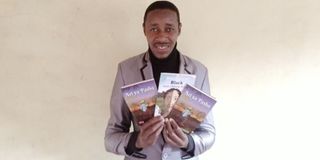By the Book: Gichimu Njeri

Gichimu Njeri is a bilingual author born and bred in Nakuru, Kenya.
What you need to know:
- The break is a blessing in disguise.
- I have plenty of time for my writing, unlike during regular school days when the schedule is tight.
- I am currently working on two manuscripts for children. They address the issues of peer pressure and good choices.
Gichimu Njeri is a bilingual author born and bred in Nakuru, Kenya. He has a particular interest in the environment, youth and children’s literature. His love for writing has so far yielded three books: Jomo and the Wild Cats, Whitened Black and Other Poems and Ari ya Pasha. His short stories and poems appear in several online literary magazines.
He teaches English and Literature at Goshen Boys’ High School in Nakuru. He holds a Bachelor’s degree in Linguistics, Media and Communication from Moi University. He is currently pursuing his second degree in English and Literature at Mount Kenya University.
When did you first realise that you wanted to become a writer?
My star in writing sparkled through reading. In my high school days, my teachers challenged me to write poetry. That is how I got published in an Anthology of Poetry about environment and conservation dubbed The Big Green Machine in the United Kingdom. To date, I believe that reading is one of the significant ways to salvage societal ills.
What is your schedule like when you are writing?
I usually write late at night. I do editing and proofreading early in the morning before I head to work. I write at least a thousand words a day.
What inspired you to write the novella ‘Ari ya Pasha’?
There is a misconception that men are enemies of girls in society. The main character, Pasha, overcomes challenges through her initiative and is backed up by men. Interestingly, all-female characters impose on her what traditions expect of women. The book brings out the concept of equity where one should be judged based on their ability and not on parameters of age and gender. It also creates awareness about the ills of FGM, power of decision making, the importance of reading and proper use of modern technology.
Why did you write ‘Ari ya Pasha’ in Kiswahili?
I love Kiswahili a lot. I also value the ideology by Ngugi wa Thiong’ o that we should write stories in our African languages. Besides, Kiswahili is growing so fast, and as users of the language increase, more books are necessary to satiate their appetite.
Which are your two most treasured books and why?
The Alchemist by Paulo Coelho and The Monk Who Sold His Ferrari by Robin Sharma. These books raise pertinent issues about choices, life, spiritualism and harmony.
If you were to recommend three books to a 10-year-old, which ones would they be and why?
I would recommend Koko Riko Run for Your Life! by Muthoni Muchemi for it boosts courage among children. I would also recommend Madalala Abadilika by Rebecca Nandwa, for it teaches the importance of hygiene among youngsters. Third, Karanga Ajikaanga by Boniface Gachugu teaches the importance of obedience.
If you had an opportunity to meet three authors, dead or alive, who would they be and why?
Prof Ngugi wa Thiong’ o, for telling the Kenyan story boldly and making an enormous contribution in the literary world. I would also love to meet Kinyanjui Kombani. His diversity and tact in addressing current affairs is impeccable. Finally, I would have been honoured to have met Ken Walibora. He demystified that we (non-coastal communities) can comfortably write in Kiswahili.
What are your thoughts on society’s reading culture in the face of popular culture?
There’s hope. Teachers, scribes and book enthusiasts are doing a great job of making books popular. Music, movies and social media can be used to promote readership. Witty characters that are well-read should be made heroes to encourage readership.
What are you working on during this Covid-19 pandemic?
The break is a blessing in disguise. I have plenty of time for my writing, unlike during regular school days when the schedule is tight. I am currently working on two manuscripts for children. They address the issues of peer pressure and good choices.
If you weren’t an author and schoolteacher, what would you be?
I would be a journalist since I hold a bachelor’s degree in Media and Communication. I treasure communication.
What are the common traps for aspiring writers?
The new breed of rogue publishers who lure young writers! Patience is key. Writing takes time, especially when dealing with traditional publishers, but the outcome is worthwhile. If the motivation to write is money, channel your energy elsewhere. Write to inform, write because you enjoy it, the rest are bonuses. Also, take time to learn the rules. There is a great need to study publishers to avoid disappointments.




